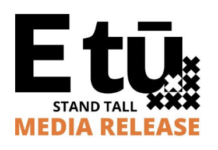Save the Children NZ calls on new government to extend Best Start payments in light of global research as more families feel impact of COVID-19
A new report released by Save the Children is recommending governments commit to and implement universal child benefits in order to ease hardships being faced by families in the wake of the Covid-19 crisis.
Save the Children New Zealand would like to see the new Labour-led government extend its Best Start payments to help families with young children in need deal with the ongoing impacts of COVID-19.
The new report A Foundation to End Child Poverty shares new research that provides evidence of the effectiveness of cash transfers and financial assistance in helping families to cope with emergencies.
The report shows hundreds of millions of children around the world have missed out on vital assistance during the pandemic impacting children’s access to healthcare, education, food and housing.
At least 68 low-and-middle income countries – with a combined child population of 594 million – have not provided any child or family focused financial support to help them survive the COVID-19 pandemic.
Based on the analysis shared in the report, Save the Children stresses that now more than ever, countries need to make progress towards universal child benefits. These investments – regular and reliable cash transfers to caregivers of children – are needed in the fight against child poverty, and to helpfamilies mitigate the impacts of future crises.
“The evidence is clear – if parents have the means, they will use payments to provide their children with vital health care, schooling and nutritious food,” says Save the Children New Zealand Chief Executive Heidi Coetzee.
“In some of our poorest countries, there has been no financial support from governments to face this hardship. Globally, just over one in three children have access to some form of child or family benefit but this is much lower – just 14% – for the Pacific.
“In New Zealand, we’ve seen the effectiveness of cash payments in keeping the economy going and providing a safety net for people to stay in work. And while many of New Zealand’s tamariki have benefited from cash payouts to workers through businesses affected by COVID-19, others have not.
“Some families have missed out on receiving this help if they were already reliant on welfare, or in low paid jobs that do not cover basic living costs. An extension of the Best Start programme is the best way to reach all children in need.
“Save the Children is recommending targeted payments for families with children in the form of a Universal Child Benefit to ensure that families are prioritised in receiving financial support. The report recommends targeting families with children under five years of age in the first instance.Investing in children in the early years can achieve the highest results.”
Universal Child Benefits are defined as regular unconditional income transfers to caregivers of children from the time of pregnancy or birth up until a child’s 18th birthday – though these may initially be limited to a narrower age range for example early childhood.
Children’s health and education outcomes are heavily influenced by household incomes.Children living in poorer households suffer the most in terms of reduced health and education outcomes. As well as immediate deprivation, this inequity has long-term impacts and may see children not able to reach their full potential and remain trapped in the cycle of intergenerational poverty.
Even in rich countries like New Zealand poverty is having a dire impact on our children.Children living in serious poverty have a mortality rate three times higher than their wealthiest peers.





